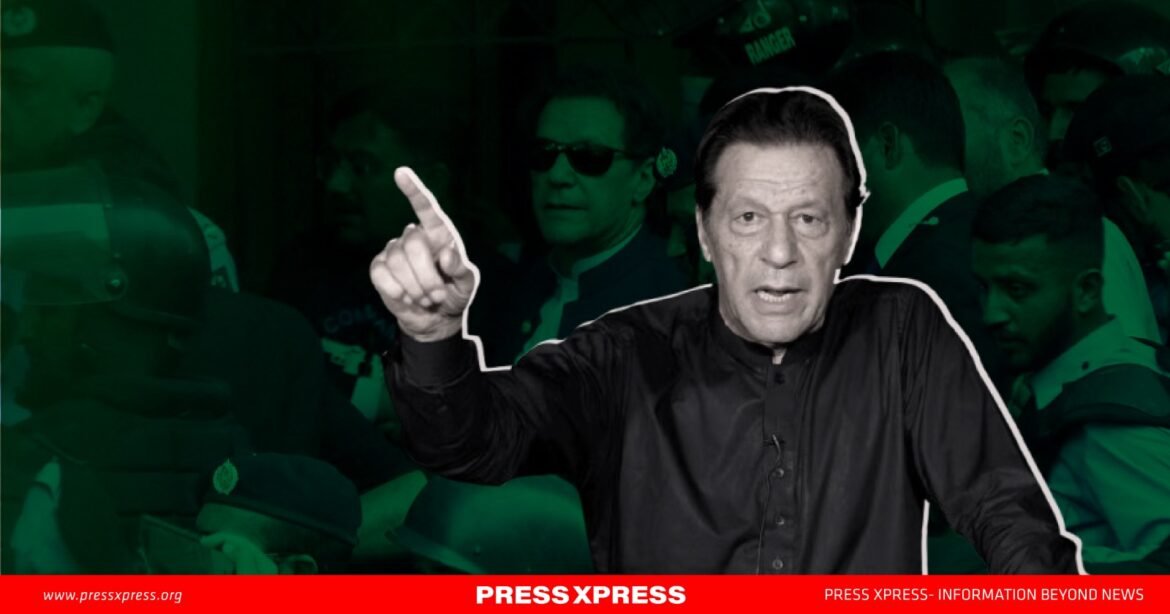The Pakistani military, which once supported Khan, has now become a target of his ire, with the former cricket star accusing the military establishment of meddling in politics
Imran Khan, the ousted prime minister and leader of Pakistan Tehreek-e-Insaf (PTI), has ramped up his opposition to the Pakistani government, warning of a civil disobedience movement if his demands are not met by December 14. This threat comes amid the fallout from PTI’s “do-or-die” protest, which aimed to secure Khan’s release and rally support for his party. Despite the protest’s failure to garner substantial results, Khan’s calls for action signal a deepening political crisis.
The PTI leader’s main demands include the release of political prisoners currently facing trial and the establishment of a judicial commission to investigate the brutal crackdowns on PTI supporters, particularly during the May 9, 2023 protests and the November 26 incidents. Khan has appointed a five-member committee to engage with the federal government on these issues, asserting that any failure to address them will prompt his movement for civil disobedience. “If these demands are not accepted, a civil disobedience movement will be launched from December 14,” Khan warned, holding the government responsible for any consequences.
A Test of Political Will
Khan’s threats of a nationwide movement are not only about securing personal or political gains but also about challenging the government’s handling of political unrest. The former prime minister has also planned a “grand gathering” in Peshawar on December 13, calling it a tribute to the PTI martyrs from the Islamabad protests. Khan’s assertion that many PTI workers remain missing, coupled with his claims of widespread human rights violations, adds a layer of urgency to his calls for judicial action. However, despite multiple appeals to Pakistan’s Supreme Court, Khan alleges that no significant action has been taken to address these concerns.
Khan’s strategy appears to be a calculated attempt to rally his base, which has remained loyal despite the legal and political challenges he faces. His party’s steadfast commitment to challenging the status quo reflects broader dissatisfaction with the military’s perceived control over Pakistan’s political landscape. As tensions mount, Khan’s calls for civil disobedience represent a critical test of his party’s resilience and the government’s willingness to engage in dialogue.
The Consequences of May 9 Violence
Khan’s legal troubles have intensified with his formal indictment on charges of inciting attacks against the military during the May 9, 2023 protests. The court’s decision to press charges comes after the violent protests that erupted following Khan’s arrest. The violence, which included attacks on military installations, resulted in at least eight deaths and widespread unrest across the country. Hundreds of protesters were arrested, and many were tried in military courts for their involvement.
While Khan maintains his innocence, he faces charges ranging from terrorism to inciting violence, with the May 9 protests being central to the case against him. The Pakistani military, which once supported Khan, has now become a target of his ire, with the former cricket star accusing the military establishment of meddling in politics. The military denies these claims, but the tension between the two sides remains palpable.
Since his arrest in May 2023, Khan has been imprisoned multiple times on various charges. Despite his incarceration, PTI remains a significant political force, with Khan’s supporters continuing to demand his release. Independent candidates from PTI won the largest share of seats in the February 2024 elections, but the party’s lack of direct participation in the political process underlines the ongoing struggle for political power in Pakistan.
A Divided Pakistan
As Khan escalates his confrontation with the government, the political environment in Pakistan remains deeply divided. The country faces a choice between negotiating with the opposition leader or risking further instability. Khan’s threat of civil disobedience adds another layer to an already volatile situation, with the potential to spark widespread protests or lead to further repression.
Khan’s call for civil disobedience underscores his determination to challenge the military’s dominance and the government’s handling of his political career. With the PTI still enjoying a strong base of support, particularly among the youth, the coming weeks will be crucial in determining whether the government can maintain control or if Khan’s movement will gain the traction needed to ignite a broader political shift.


